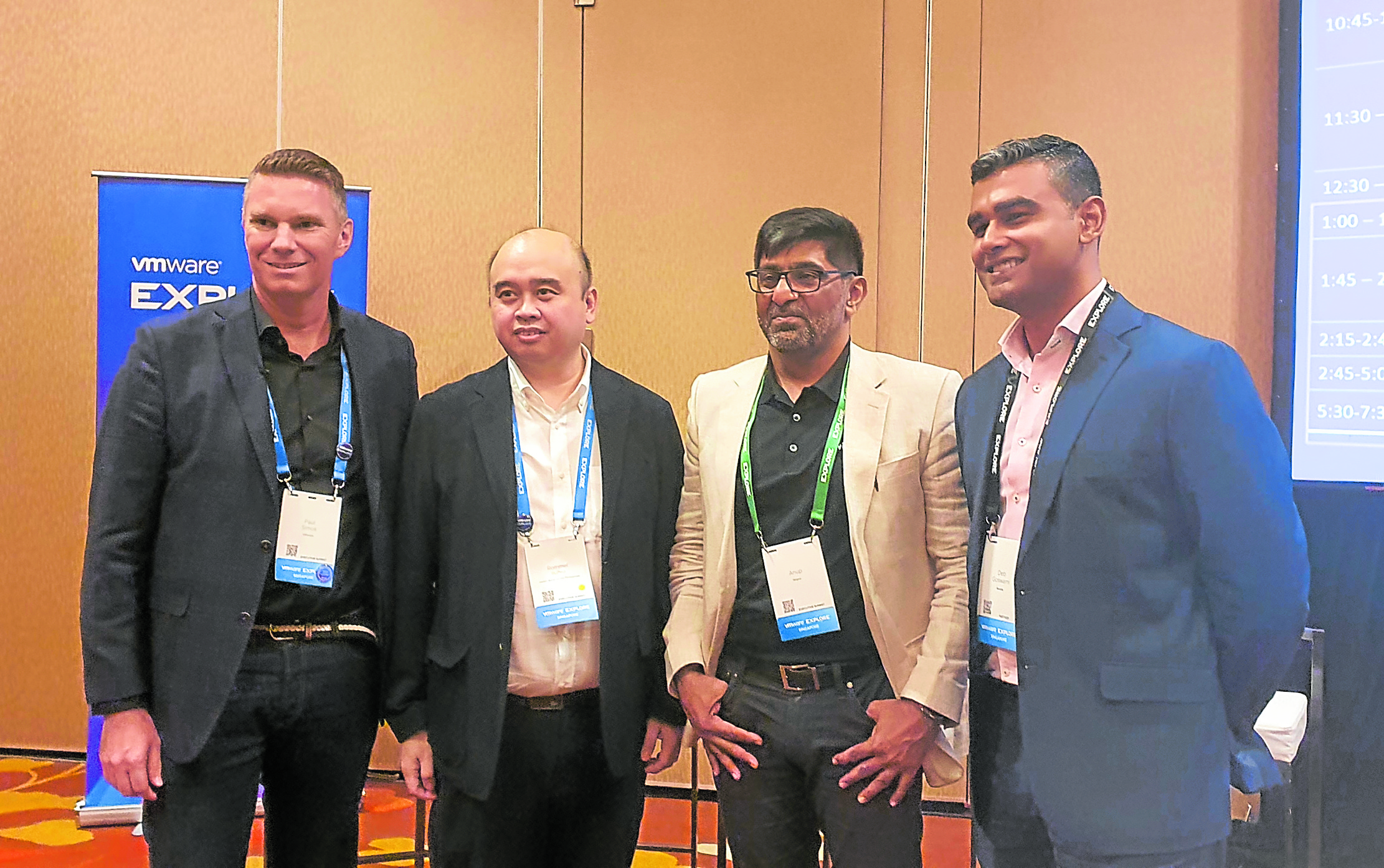Not just for bandwagon: PH companies spend wisely on cloud

TECHIES (From left) Paul Simos, VMWare vice president and managing director; Romel Ilunio, UnionBank vice president; Anup Purohit, Wipro chief information officer and Deb Goswa-mi, NVIDIA structured AI technologist for developer programs at Asia Pacific — TYRONE JASPER C. PIAD
SINGAPORE—Philippine companies have become more prudent when it comes to spending on cloud—a technology designed to improve operational efficiency—as they scale up business and infuse more capital for digital initiatives.
While cloud was initially deployed as a cost-saving measure, VMWare country manager Walter So tells the Inquirer that companies sometimes end up racking up a bill instead as they augment cloud capacity amid increasing data requirement.
“It is not about cost. It is about agility. It is about providing those other sets of resources that you’re able to get as a service within that cloud model,” So explains.
Cloud technology has been supporting hybrid work setup, a trend that has risen during the pandemic after mobility was heavily curtailed. It makes documents, files and applications readily available for employees via devices like laptops, smartphones and tables.
So notes that the cost of using the cloud varies depending on enterprise needs. But the trend is using several platforms because each cloud has specific requirements; this is called the multi-cloud approach. For example, he explains that applications like Google Docs and Google Sheets will only run on Google’s cloud platform.
Article continues after this advertisement“There are just these sets of applications that run better and [are] built better on certain platforms. As an enterprise, you will pick what best suits you,” he says.
Article continues after this advertisementNevertheless, the companies are mindful of the monthly cash outflow, making sure they are maximizing the cloud resources.
He says that VMWare, a cloud computing company, provides clients with helpful insights to optimize data storage use. This includes identifying idle files and applications that can just be deleted instead of taking up unnecessary space.
In addition, So explains that clients are also discerning public and private cloud usage and how each one will cost them.
Google GCP, Microsoft Azure, Oracle, Alibaba AliCloud and Amazon AWS are public cloud vendors providing data storage as a service and charging clients on a regular basis, usually per month. Private cloud, meanwhile, refers to a company’s own infrastructure supporting existing networks, which can be less costly but they should also take into consideration spending on technology management and upgrade, among others.
According to a study by Alibaba, 91 percent of the Philippine companies are likely to increase investment in cloud this year to better handle their workloads.
An International Data Corp. study, meanwhile, projects that the global public cloud service spending will reach $1.35 trillion in 2027, with a compounded annual growth rate of 19.9 percent between 2023 and 2027.
Embracing technology

Cloud technology is designed to improve operational efficiency, including those for hybrid workplace setup – VMWare website
Local companies, including Union Bank of the Philippines and Converge ICT Solutions Inc., have already been integrating cloud into their operations.
UnionBank vice president Rommel Ilunio, during the VMWare event here, says that cloud adoption has enabled the Aboitiz-led financial institution to grow the business faster and immediately bring products to over 10 million customers.
“You need to be able to deliver fast. They can get that functionality that we would give to the clients,” he tells the Inquirer on the sidelines.
“If there’s an issue in one of our servers, we can easily provision and can easily create another,” he adds.
Ilunio advises companies not to rush on digital transformation spending and to take their time to study if the technology employed truly boosts their operations. Build one, evaluate and scale up after if the need arises, he says.
UnionBank has been ramping up investments in digital initiatives, most recently securing its virtual asset service provider license from the Bangko Sentral ng Pilipinas. With this, it has become the first local universal bank to offer mobile cryptocurrency trading.
Like UnionBank, internet service provider Converge says cloud technology has enabled better customer service delivery.
“VMware’s robust solutions and architecture helped us with our conquest to empower our customers with advanced digital tools to further their business outcomes,” Converge executive vice president and chief information officer Ulysses Naguit says in a statement.
“Collaborating with VMware has been instrumental for us in pursuing more advanced digital capabilities in fulfilling our endeavor to expand our global reach in serving our customers,” he adds.
As of the second quarter, Converge had a household coverage of 62.3 percent, already surpassing the 55-percent target by 2025.
Cybersecurity concerns
Cloud adoption has made handling workloads easier but this has also widened the attack surface for cyberthreats, according to Paul Simos, VMWare vice president and managing director for Southeast Asia and Korea.
He explains that employees working remotely now have direct access to corporate networks via devices outside the office premises. This means more potential entry points for cyberattacks.
Among the digital threats targeting enterprises is business email compromise, a form of cyberattack whereby hackers send emails embedded with suspicious links to business emails of company employees. It seeks to trick employees into providing access to the corporate information technology system.
Fortunately, Simos says that companies in the region are more aware of the potential impact of such threats.
“As companies look into the cloud, security is becoming more embedded,” he stresses. INQ